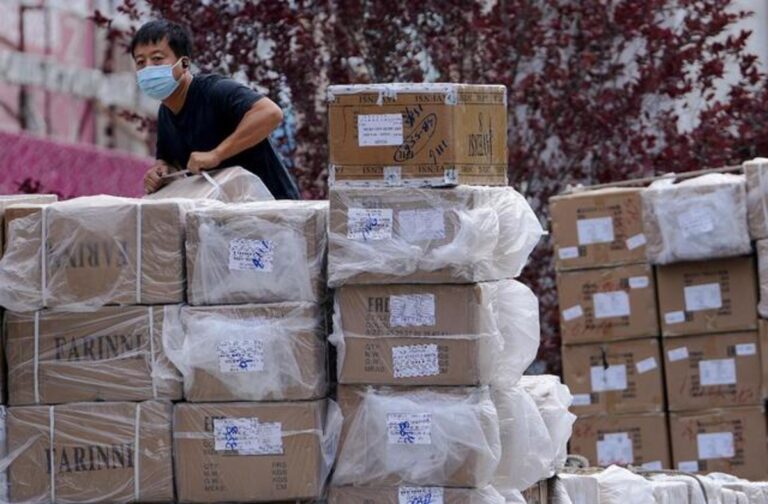🎧 Listen to This Article
WASHINGTON, D.C. – President Donald Trump has announced the end of the de minimis provision, a long-standing tax exemption that has allowed millions of low-value Chinese goods to enter the U.S. without tariffs. This change, effective May 2, 2025, will reshape the way e-commerce businesses, particularly those from China, operate in the U.S. market. The move aims to close a trade loophole that has given Chinese e-commerce giants an edge, but it also brings significant consequences for U.S. consumers and retailers.
Context & Background: Why Is This Happening?
For years, U.S. consumers have enjoyed the benefit of low-cost Chinese products entering the country without paying taxes, thanks to the de minimis rule. Initially introduced in 1938 to facilitate the flow of small, low-value goods, this provision allowed packages valued at $200 or less to enter the U.S. without incurring import duties. In 2016, the threshold was raised to $800, and it became a major boon for e-commerce companies like Shein and Temu, which capitalized on this rule to offer ultra-affordable products.
However, as cross-border e-commerce grew, so did concerns over the policy. In 2023 alone, the U.S. processed more than 1 billion low-value packages from China. Critics argued that the exemption fueled the influx of counterfeit goods and illicit substances, including fentanyl, and harmed U.S. businesses by making it easier for foreign companies to flood the market with cheap imports. Trump’s executive order is aimed at reversing these trends.
Impact on Businesses & Consumers
The new regulation will affect millions of daily shipments, most of which come from China. For businesses like Shein and Temu, which have thrived on the de minimis exemption, the shift could disrupt their entire U.S. business model. These companies, which rely on low-cost goods delivered rapidly, may face higher costs due to the imposition of tariffs—either 30% of the product value or $25 per item, set to increase to $50 per item starting June 1.
While large retailers like Amazon and Walmart will also feel the impact, they are better equipped to navigate these changes. Smaller businesses, however, could struggle to adapt to the added costs and delays in delivery times. Consumers, particularly those in lower-income brackets, could see higher prices for many everyday items.
Government & Expert Reactions
U.S. officials, including Customs and Border Protection, are preparing to handle the surge in tariff processing. Hilton Beckham, an assistant commissioner at the agency, assured the public that the automated systems were ready to enforce the new tariffs and streamline operations. However, concerns persist regarding whether the U.S. government is adequately prepared to manage the sheer volume of low-value shipments.
Business leaders, on the other hand, are mixed in their responses. Supporters of the de minimis exception argue that its removal will drive up prices for consumers and negatively affect small businesses that rely on low-cost imports to stay competitive. Ram Ben Tzion, CEO of the digital platform Publican, warned that companies like Shein and Temu might be forced to reconsider their U.S. market strategies or even exit the market entirely due to the increased operational costs.
What’s Next? Future Outlook
With the shift coming into effect in just a few weeks, companies like Shein and Temu are already making adjustments. Shein, for example, has started investing in U.S. fulfillment centers to speed up delivery times and mitigate the impact of the tariffs. However, whether these moves will be enough to offset the cost increases remains uncertain.
As the situation unfolds, U.S. consumers will likely face a more limited range of affordable, fast-fashion goods, while domestic retailers may be able to reclaim some market share lost to Chinese imports. The full impact of the de minimis change will become clearer in the coming months as businesses adapt to new import regulations.
Data, Quotes & Expert Analysis
- Marshal Cohen, Chief Retail Advisor at Circana, noted, “Shoppers will face fewer options and longer wait times. While they can still purchase these items, the affordability and speed will no longer be as appealing.”
- According to the U.S. Congressional Research Service, Chinese exports of low-value packages surged from $5.3 billion in 2018 to $66 billion in 2023, with the U.S. being a major destination. This dramatic rise highlights the significance of the de minimis exception and the stakes involved in its elimination.
- Rep. Rosa L. DeLauro, a Democrat from Connecticut, praised the action, saying, “For too long, this customs loophole has let foreign exporters flood our market with cheap goods, resulting in factory closures, job losses, and deaths.”
Conclusion
The end of the de minimis exemption marks a significant shift in U.S. trade policy, one that aims to level the playing field for domestic businesses but comes with potential risks for consumers. The next few months will be critical as businesses adjust to new import tariffs, and as the U.S. Customs and Border Protection prepares to process a vast influx of small shipments.
For consumers, this means paying more for items that were once delivered cheaply and quickly. For U.S. retailers, it may offer a chance to regain some of the market share lost to foreign competition—but it will also require them to adapt to a changing retail landscape.
For further details, clarification, contributions, or any concerns regarding this article, please contact us at editorial@tax.news. We value your feedback and are committed to providing accurate and timely information. Please note that our privacy policy will handle all inquiries



